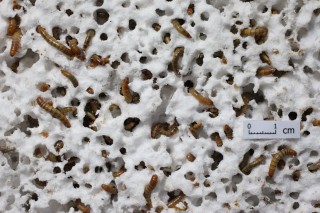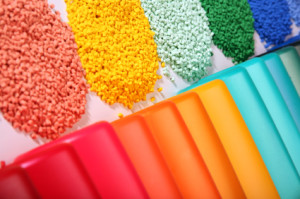Synthetic diamonds are typically created by subjecting graphite to immense pressure and high temperatures, which makes production in the industry low and costly. Things may be about to change due to new research performed at North Carolina State University. Researchers have found a new phase for carbon called “Q-carbon” which is produced at ambient temperatures and pressure. The structure is surprisingly close to diamond, with the added the added benefit of exhibiting a couple of unique properties, namely, Q-Carbon is actually harder than diamond.
Category: Industry News
Mealworms Present a Surprising Solution to EPS Waste
 EPS, or expanded polystyrene, is the plastic foam commonly found in food containers and has been a source of controversy due to the unrecyclable waste its use creates. Now researchers may have found an unlikely solution: Mealworms. The larvae of the darkling beetle will not only feed on EPS, but the microorganisms in their gut biodegrade the material, later expelling a seemingly harmless product that may be useful as soil for crops. The plastic doesn’t seem to be toxic to the bugs either. The research is still in its early stages, but many are excited by the possible implications for EPS recycling.
EPS, or expanded polystyrene, is the plastic foam commonly found in food containers and has been a source of controversy due to the unrecyclable waste its use creates. Now researchers may have found an unlikely solution: Mealworms. The larvae of the darkling beetle will not only feed on EPS, but the microorganisms in their gut biodegrade the material, later expelling a seemingly harmless product that may be useful as soil for crops. The plastic doesn’t seem to be toxic to the bugs either. The research is still in its early stages, but many are excited by the possible implications for EPS recycling.
For more information, see Plastics News.
EPA Delays Chlorinated Paraffin Ban
The U.S. Environmental Protection Agency (EPA) announced a delay on a ban of the production and import of mid and long-chain chlorinated paraffins until mid-2017. Chlorinated paraffins (CPs) have long been used as additives in metalworking fluids, and groups such as the Chlorinated Paraffins Industry Association (CPIA) and the Independent Lubricant Manufacturers Association (ILMA) have been working to convince the EPA not to ban CPs at all. The ban was originally supposed to go into effect in May 2016, but the EPA announced the delay in order to give manufacturers time needed to transition.
Shell Moves Forward With Shale Gas
Back in June, Shell took further steps toward its investment in shale gas by purchasing a site near Pittsburgh for a plastics and petrochemicals plant. The preliminary plants indicated that the plant would have three polyethylene resin production lines as well as an ethylene manufacturing line, and seven ethane crackers. The site would be able to take advantage of the nearby ethane source from shale natural gas.
P&G Adds Bittering Agent to Improve Safety
Procter & Gamble Co. recently announced they would be adding a bittering agent to the outside layer of their single-use laundry packets. The move comes after reports of children who were attracted to the bright candy-like colors accidentally ingesting the packets, leading to poisoning. While the product has gained in popularity over the years for its easy of use, there were calls for changes to the product in response the unintended danger. Europe recently put new rules into place concerning the products, and Congress in the US is looking to do the same.
Bittering agents, such as denatonium benzoate, can be added to consumer products containing harmful substances in order to protect against accidental ingestion by small children or animals. The extremely bitter taste “elicits oral repulsive behavior” which prevents the substance from being eaten, and have been used for many years as a safety prevention method for poisonous or harmful products.
Global Outlook for Polyvinyl Chloride (PVC)
 Polyvinyl Chloride (PVC) is currently the third-largest volume thermoplastic and continues to show global growth. PVC demand is a price-sensitive market and has felt the impacts of the lower crude oil prices. After the major drop in crude oil prices last November, PVC prices began falling as much as 30% in some regions. Prices began to rebound in February of this year, reaching another peak during the second quarter of 2015. Today’s market is seeing an oversupply situation due to China’s investment in new vinyl capacity beyond its demand. North American PVC producers have benefited from the increased availability of ethylene driven by the sale gas boom. This in combination with their integration into chlor-alkali gives them a cost advantage position in comparison with other regions, and may foster further vinyl investments in the future.
Polyvinyl Chloride (PVC) is currently the third-largest volume thermoplastic and continues to show global growth. PVC demand is a price-sensitive market and has felt the impacts of the lower crude oil prices. After the major drop in crude oil prices last November, PVC prices began falling as much as 30% in some regions. Prices began to rebound in February of this year, reaching another peak during the second quarter of 2015. Today’s market is seeing an oversupply situation due to China’s investment in new vinyl capacity beyond its demand. North American PVC producers have benefited from the increased availability of ethylene driven by the sale gas boom. This in combination with their integration into chlor-alkali gives them a cost advantage position in comparison with other regions, and may foster further vinyl investments in the future.
Bio-Based Feedstock Movement Gaining Momentum
Europe has found a future in agricultural production in the north-west corner of the continent. Researchers have found that the cost to produce sugar in that part of the continent would be among the lowest in the world. The estimate by Deloitte is that Europe could produce nearly 30% more agricultural products than they already are, rivaling the sugar cane production in Brazil as well as corn production in the Midwest United States. Bio-based industries currently make up about 1% of the European Economy, where as the investors want to look for a way to bolster that to around 10%. This is now possible, and with this new development in the prosperity of the European land this now means that 95% of all products today can be bio-based.
For more information see ICIS.com
Scientists Create New Superchilled Compound
The notion of absolute zero has been around for quite some time. Lowering the temperatures of a molecule as close to zero as possible could reveal some wacky physics that could reveal some properties on exotic states of matter. Now, a team at MIT led by physicist Martin Zwierlein, was able to cool down sodium potassium gas using a process involving lasers to dissipate the energy of individual gas molecules. They succeeded in chilling the molecules as low as 500 nanokelvins, which equates to -459.67˚F. This is interesting because sodium and potassium don’t usually form compounds since both are positively charged and would typically repel each other. Although they achieved the formation of this compound, it wasn’t as stable as an everyday chemical. It only lasted 2.5 seconds before it broke apart, but when dealing with such extreme conditions that is a very long time. This may not seem like a great advancement, but it could shed some light on mysteries such as dark energy, the mysterious substance that is apparently pulling our universe apart.
For more information see Business Insider.
Castor Crops May have a Future in the U.S.
Due to the federal government ceasing their price supports in 1972, the Castor crop has not been grown in the U.S. since then. Because of this, the U.S. had no choice but to turn to producers in China, India, and Brazil to supply its needs. But now, according to a new University of Florida study, the Castor plant can be grown in Florida using proper management techniques. Since the Castor industry is quite large already, this development indicates an immense economic growth potential.
For more information visit ScienceDirect.com.
Researchers Develop Catalyst to Remove Benzene From Gasoline
Benzene, which is an aromatic hydrocarbon and a natural constituent of crude oil, has been recognized by the Environmental Protection Agency as a known contributor to cancer. According to the U.S. Energy Information Administration, an estimated 137 billion gallons of gasoline were consumed in the United States last year. This, unfortunately, makes benzene a substantial environmental and health problem. But recently, strides have been made to remove benzene from gasoline. Northwestern University scientists have developed a catalyst that has effectively removed benzene from the other aromatic compounds in gasoline, making it cleaner and more efficient. The catalyst is described as an organometallic molecule. While normally, the molecule is composed of expensive platinum, this catalyst is made from an affordable simple metal that is absorbed onto a particular oxide support. Since the process of removing benzene would be inexpensive, this could keep the cost of gasoline down in the future.
For More Information see Phys.org.
